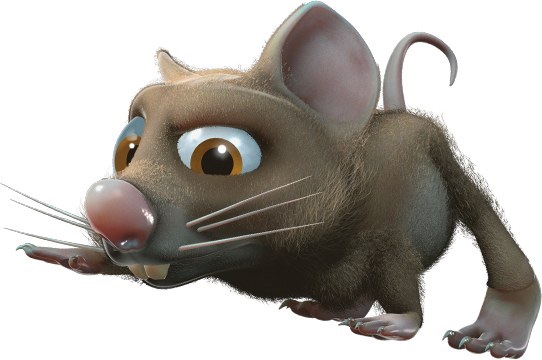Skunk Facts
Known mostly for their recognizable and potent odor, skunks are found all across North America. They range in size from 20 to 30 inches long with a 10 to 15 inch tail. Their bodies are distinguished by black fur with a white strip running down their back. Skunks breed in late February through March. Most skunks won’t live beyond a year, but if some can survive the cold winter, some can live up to 7 years. They are mostly nocturnal and their diet consists of insects, snakes, mice, fruit, nuts, fish and garbage. Skunks can carry various diseases as well as fleas, lice, ticks or parasitic worms.
Skunk Damage
The most obvious problem with skunks is that they reek. The odor they cause will stick around for days and is downright annoying. They only spray when they feel threatened, so this could put you and your pets at risk of wearing the world’s nastiest perfume.
They also will den under porches, decks, garage, or any other secluded place that will allow them to raise their young. When they go looking for food, they will tear up your lawn looking for insects. Skunks have also been known to raid coops searching for eggs and chickens.
Skunks are also carriers of rabies, a disease that causes intense damage to the nervous system. Brains of humans become inflamed, fever occurs, later accompanied by violent motion, confusion, and loss of consciousness. It is essential to immediately get yourself checked out if you’ve been bitten by a skunk to ensure you haven’t been infected.
Types of Skunks
Some types of skunks include the American hog-nosed skunk, striped hog-nosed skunk, hooded skunk or the eastern spotted skunk.
Skunk Identification
You might hear them clicking, hissing, grunting, growling, purring, or screeching, especially when they are younger. Skunks also make tracks in dirt or mud that have five toes and long front nails. If they’ve sprayed recently, you’ll smell a foul, nauseating odor. When they are feeding, they will leave funnel-shaped holes in lawns. If skunks get inside a chicken coop, they will kill only one or two birds. You might find skunk droppings that include body parts of insects, as well as fur and seeds.
Skunks In The Yard & The Garden
If your home is situated near wooded areas like forests, ravines, or grassy areas, it’s possible to see these little stinkers creeping around your yard. Suburbs, cities, and farmland see their fair share of skunks, too.
Frequently Asked Questions
How do I keep skunks away?
Removing their food and shelter is the first place to start. Take your garbage out in the morning so skunks can’t raid it at night. Secure your trash cans with lids so they can’t climb inside. Keeping rodents out of buildings by sealing cracks and covering entry ways will help, as skunks love to eat them.
If they are denning under a porch or deck, screen any entry points with wire mesh or hardware cloth. Make sure that the hole is not only covered, but that it also goes deep into the ground, too. Skunks will dig if they need to, so planting these devices far into the ground will help discourage them.
Trapping is also an option, however you should consult a pest control professional to see what devices will be right for your specific situation.
What are the benefits of professional skunk pest control?
A pest management professional has the education, equipment and skills necessary to effectively address a skunk problem. Finding and treating the skunks can be challenging, especially if they are loose in your yard. A pest management professional provides their expertise to identify the pest problem and determine the best possible solution to resolve the skunk nuisance.


